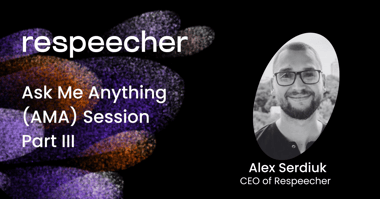Create Better Educational Apps with Voice Synthesis Software
Dec 29, 2022 1:48:21 AM

Over the past couple of years, the concept of traditional education and the process of implementing it were forced to change. Physical presence in a classroom is no longer a must. With the rise of the internet and new technologies, people now have access to a quality education whenever and wherever they want it. They only need an internet connection or special educational applications installed on their phones or computers. Integrating voice AI technology into educational apps can further enhance the learning experience by providing interactive and personalized guidance to learners.
Due to the high demand, the competition in the educational apps market space is hotter than ever, and creating a high-quality product requires leveraging new approaches. AI voice synthesis has emerged as a powerful tool for educational apps, enabling more immersive and engaging learning experiences through natural-sounding speech.
Online education trends
Online educational programs emerged in 1989, with the University of Phoenix and CompuServe as one of the first consumer online services. In 1991, the World Wide Web (Web) was unveiled, and the University of Phoenix was among the first to offer online education programs over the internet. After that, online programs began to expand in scope at a tremendous speed.
Another event that led to a surge in their popularity was the COVID-19 pandemic. From 2012 to 2019, the number of students using hybrid learning at traditional universities went up by 82 percent. The COVID-19 pandemic in 2020 accelerated that growth by an additional 92 percent. Since 2020, 98 percent of universities have moved their classes online. In 2021, the e-learning market surpassed $315 billion. With the advancement of generative AI, online educational platforms can now offer personalized learning experiences tailored to each student's needs and preferences, further enhancing the effectiveness of online education.
The benefits that online education delivers to students and teachers are:
- Flexibility
- Wide selection of programs
- Accessibility
- Customized learning experience
- Cost-efficiency
Every one of these benefits is only possible due to technologies utilized by these high-quality educational applications. Creating applications of this level of complexity takes years, millions of dollars, and comprehensive industry knowledge. Still, despite these obstacles, many advanced education apps have appeared within the last decade. And only a few of them have scaled their reach using AI voice generators. Moreover, ethical voice synthesis technology ensures that these apps maintain respectful and inclusive learning environments, promoting trust and integrity in online education.
Types of educational apps
Students, parents, and teachers are searching for educational apps capable of delivering an ideal digital learning environment. As children age, the ideal learning environment tends to change. At every stage of a child’s education, the demand remains high for meaningful content that delivers a discoverable, challenging, and rewarding experience. Today, there are so many educational applications that they’ve taken on their own system of categories. Some of the most popular ones include:
- Language learning apps. Some of the most popular ones are Lingvist and Babbel.
- Remote tuition platforms. ABC360, and VIPABC are the most vivid examples of this category, to name a few.
- Learning apps for disabled people. These are ModMath, MyTalkTools Mobile, Stop, Breathe & Think, and many more.
- Educational mobile apps for kids. YouTube Kids, Prodigy Math, Busy Shapes are engaging apps for children of different ages.
- Test prep apps. Some of the most popular from this category are GradeUp, Professional Pocket Prep, and My Study Life.
Considering the vast number of education applications, the competition in the market is very high and will remain so over the next five years. Developing new products means taking into account the latest challenges facing the market and coming up with new ways to overcome them, including integrating advanced speech synthesis technology for enhanced interactive learning experiences.
Challenges of creating education apps
Many educational applications fail soon after development commences due to a number of different challenges in their way:
Lack of teacher presence
Usually, educational apps and platforms replace the teacher but omit any possibility of collaborating with them or using their feedback during app development. That's why teachers and educators often want to avoid incorporating new technologies into their educational practices, leading to a failed product.
User Engagement
People who download your app to start learning something new usually have a high level of motivation and commitment. This means that their level of user engagement is high.
However, if an app doesn't include engaging features, various interactive elements, and so on, that initial level of excitement and curiosity fades, along with user motivation. This is why approaches like "gamification" can be a win-win decision for Edtech developers.
Language limitations
Language is a crucial aspect of personalization. Using different languages when creating lessons will help you increase user engagement and monetization. Ignoring the language aspect, in turn, means never being able to reach a wider audience.
Still, recording relevant lessons in different languages is almost impossible and is a sure way to drive up costs, consume far more working hours, and create headaches.
Respeecher solves this challenge as it allows native English speakers to speak fluently in any other language in their own voice using voice cloning technology. Generative AI opens doors for presenting your educational app to the rest of the world, as you can create content using the language of any specific country or region. Using Respeecher’s technology, Maye Musk and Abby Savage spoke Ukrainian in support of the Ukrainian people.
Respeecher voice cloning technology helps to clone and reproduce children's voices which is especially beneficial for educational apps intended for children.
The use of a voice over generator for creating or expanding educational apps facilitates the effortless translation of content into various languages, thereby enhancing accessibility and inclusivity for learners across the globe.
To sum up
The global e-learning market is anticipated to climb to $400 billion by 2026. Thus, there are still a number of different possibilities for newbies to step in and develop revolutionary educational apps. However, with new opportunities, new challenges inevitably surface. We can't help you with every problem along the way, but we can definitely save you time and reduce costs by freeing you from hundreds of hours of studio recording. Try it now!

Margarita Grubina
Business Development Executive
Margarita drives Respeecher's growth through strategic market analysis and nurturing client relations. Her role is pivotal in discovering and tapping into new market opportunities, as well as maintaining strong connections with clients. She combines her industry expertise with a forward-thinking approach, ensuring Respeecher's offerings resonate with evolving market needs in the dynamic field of voice AI technology.



